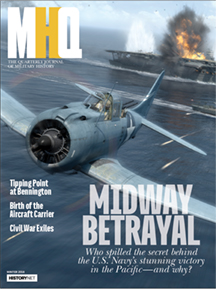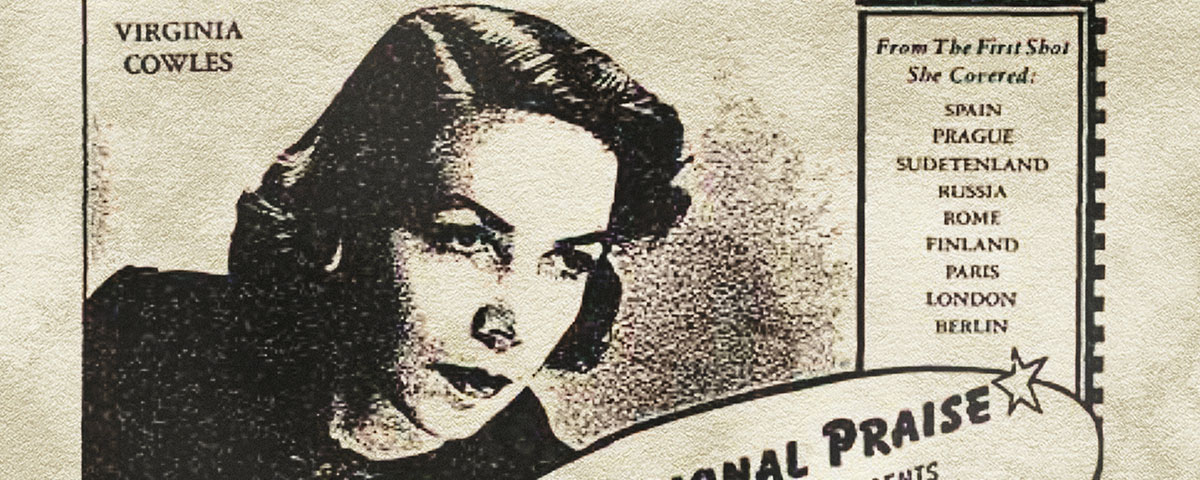Virginia Cowles was born in Brattleboro, Vermont, in 1910, and gravitated to journalism in her early 20s. In 1936, after working on the gossip columns of the Hearst newspapers in Boston and New York, Cowles went to Spain intending to become a war correspondent, and soon she was filing stories on the Spanish Civil War for Hearst, the Daily Telegraph, and the Sunday Times. After leaving Spain, she reported from all over Europe, chiefly as a roving correspondent for the Sunday Times. She was in Berlin the day Germany launched its assault on Poland, in Helsinki as the Russians invaded Finland, and on her way to Paris as the Germans marched on the capital and most of its inhabitants were on the roads in a great exodus to the south. She witnessed the first day of the London Blitz and continued to report on the Battle of Britain throughout World War II.
Cowles detailed her experiences as a war correspondent in her first book, Looking for Trouble, published in 1941, from which the narrative that follows is excerpted.
In 1945 Cowles married Aidan Crawley, a British politician and journalist who had spent four years in a German POW camp during World War II. Cowles later turned her attention to writing biographies, and over the next 30 years her subjects included Winston Churchill, Edward VII, and the Romanov, Rothschild, and Astor families. She was killed in an automobile accident in France in 1983.
TRY TO THINK IN TERMS OF MILLIONS. Try to think of noise and confusion, of the thick smell of petrol, of the scraping of automobile gears, of shouts, wails, curses, tears. Try to think of a hot sun and underneath it an unbroken stream of humanity flowing southwards from Paris, and you have a picture of the gigantic civilian exodus that presaged the German advance.
I had seen refugees before. I had seen them wending their way along the roads of Spain and Czechoslovakia; straggling across the Polish-Roumanian frontier, trudging down the icy paths of Finland. But I had never seen anything like this. This was the first mechanized evacuation in history. There were some people in carts, some on foot, and some on bicycles. But for the most part everyone was in a car.
Those cars, lurching, groaning, backfiring, represented a Noah’s Ark of vehicles. Anything that had four wheels and an engine was pressed into service, no matter what the state of decrepitude; there were taxi-cabs, ice-trucks, bakery vans, perfume wagons, sports roadsters and Paris buses, all of them packed with human beings. I even saw a hearse loaded with children. They crawled along the roads two and three abreast, sometimes cutting across the fields and straddling the ditches. Tom [Delmer of the London Daily Express] and I caught up with the stream a mile or so outside Paris on the Paris–Dourdan–Chartres road and in the next three hours covered only nine miles.
We saw terrible sights. All along the way cars that had run out of petrol or broken down were pushed into the fields. Old people, too tired or ill to walk any farther, were lying on the ground under the merciless glare of the sun. Often the stream of traffic was held up by cars that stalled and refused to move again. One car ran out of petrol halfway up a hill. It was a bakery van, driven by a woman. Everyone shouted and honked their horns, while she stood in the middle of the road with her four children around her begging someone to give her some petrol. No one had any to spare. Finally, three men climbed out of a truck and in spite of her agonied protests, shoved the car into the ditch. It fell with a crash.…Once again the procession moved on.
In that world of terror, panic and confusion, it was difficult to believe that these were the citizens of Paris, citizens whose forefathers had fought for their freedom like tigers and stormed the Bastille with their bare hands. For the first time, I began to understand what had happened to France. Morale was a question of faith; faith in your cause, faith in your goal, but above all else, faith in your leaders. How could these people have faith in leaders who had abandoned them? Leaders who had given them no directions, no information, no reassurances; who neither had arranged for their evacuation nor called on them to stay at their places and fight for Paris until the last? If this was an example of French leadership, no wonder France was doomed. Everywhere the machinery seemed to have broken down. The dam had begun to crumble and hysteria, a trickle at first, had grown into a torrent.
Even the military roads were overrun with panic-stricken civilians. Tom was an officially accredited war correspondent, so he swung off on to one of them. Although the entrance was patrolled by gendarmes, who demanded our credentials, there was no one to keep traffic from streaming in at the intersections and a mile or so farther on we once again found civilian cars moving along two or three abreast.
The only military units that succeeded in getting a clear berth were the tanks. Once we looked back to see two powerful fifteen-ton monsters thundering up behind us. They were travelling about forty miles an hour and the effect was remarkable. People gave one look and pulled in to the ditches. They went rolling by, the great treads tearing up the earth and throwing pieces of dirt into the air like a fountain. After them came a number of fast-moving lorries and a string of soldiers on motor-cycles with machine-guns attached to the side-cars. They all seemed in excellent spirits: one of the tanks was gaily marked in chalk “La Petite Marie” and the trucks and guns were draped with flowers. Two of the motor-cyclists shouted at us, asking if we had any cigarettes. Tom told me to throw them a couple of packages. They were so pleased they signalled us to follow them, escorted us past the long string of civilian cars to the middle of the convoy and placed us firmly between the two tanks. For the next ten or fifteen minutes we roared along at forty miles an hour. Unfortunately, eight or nine miles down the road they turned off, the motor-cyclists waved good-bye and blew us kisses, and once again we found ourselves caught up in the slow-moving procession of evacuees.
It was nearly nine o’clock now and we had covered little more than twenty miles. When we had left Paris at five o’clock there were already reports that the Germans were circling around on both sides of the capital to cut off the roads in the rear. Tom had a military map and we decided to try the cross-country lanes. Some of them were scarcely more than footpaths but we could at least average ten or twelve miles an hour, which was a great improvement. It was getting so dark it was difficult to see and twice we barely avoided running over people with no lights on their bicycles. Suddenly the sky lit up with a flash and we heard a far-away rumble. It was the first gunfire I had heard all day. “Something’s creeping up on us,” said Tom. “Still, if we keep on like this, I think we’ll be all right.”
We drove along the twisting lane for five or six miles. The rumble of guns seemed to be louder and the flashes against the sky more frequent. It was a beautiful night. The sky was clear and starry, and the only noise to break the quiet was the drone of crickets and the spasmodic thunder of guns.
We did the next hundred miles to Tours in about five hours. We had learned the trick now and kept entirely to the country lanes which, rough though they were, were fairly clear of refugees. It was only when we got within ten miles of Tours and were forced back on the main road again that the trickle once again became a mighty stream. It took us nearly an hour to get into the city. The great bridge over the Loire looked like a long thin breadcrust swarming with ants.
Finally at one-thirty, we drew up before the Hôtel de l’Univers. The first person I saw was Knickerbocker [H. R. Knickerbocker, an American war correspondent], just coming out of the door.
“My God! How did you get here?”
“You’re always asking me that.”
“But where’ve you come from?”
“Paris.”
“Paris! But the Germans went into Paris hours ago. When did you leave?”
I told him.
“They were in the Bois de Boulogne last night. You must have rubbed shoulders with them on the way out. Probably you just didn’t recognize them,” he added with a grin. “All soldiers look grey in the dark.” MHQ
[hr]
This article appears in the Winter 2018 issue (Vol. 30, No. 2) of MHQ—The Quarterly Journal of Military History with the headline: The Great Exodus
Want to have the lavishly illustrated, premium-quality print edition of MHQ delivered directly to you four times a year? Subscribe now at special savings!






